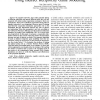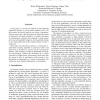234 search results - page 41 / 47 » A polynomial-time nash equilibrium algorithm for repeated ga... |
VTC
2010
IEEE
14 years 10 months ago
2010
IEEE
— In this paper, we look into the channel allocation problem for a non-cooperative cognitive vehicular ad-hoc communication network with multiple communicating pairs distributed ...
106
click to vote
GLOBECOM
2010
IEEE
14 years 9 months ago
2010
IEEE
In cognitive networks, since nodes generally belong to different authorities and pursue different goals, they will not cooperate with others unless cooperation can improve their ow...
TSP
2010
14 years 6 months ago
2010
Abstract--The concept of cognitive radio (CR) has recently received great attention from the research community as a promising paradigm to achieve efficient use of the frequency re...
IOR
2008
14 years 11 months ago
2008
Wireless sensor networks pose numerous fundamental coordination problems. For instance, in a number of application domains including homeland security, environmental monitoring an...
SASO
2009
IEEE
15 years 6 months ago
2009
IEEE
In this paper, we present an analysis of self-organizing bandwidth sharing in priority-based medium access. For this purpose, the priority-based Access Game is introduced. Analysi...


